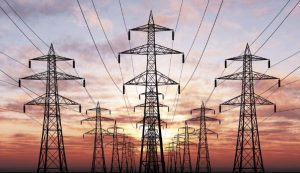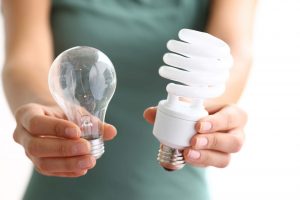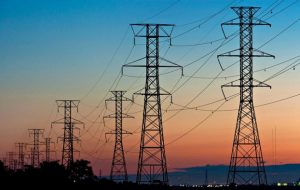
Electricity consumption in Ukraine, taking into account in-process losses in power grids, increased by 6.5% in January-March 2021 (by 2.591 billion kWh) compared to the same period in 2020, to 42.316 billion kWh, the Energy Ministry told Interfax-Ukraine.
Excluding in-process losses electricity consumption in January-March 2021 increased by 6.1% (by 1.934 billion kWh), to 33.675 billion kWh.
The country’s industry, excluding in-process losses, boosted electricity consumption by 3.5%, to 12.923 billion kWh. In particular, metallurgical industry consumed 6.99 billion kWh (2.5% more compared to January-March 2020), fuel industry some 854.8 million kWh (0.1% less), machine building industry some 1.021 billion kWh (9.9% more), chemical and petrochemical some 1.094 billion kWh (9.5% more), food and processing some 1.055 billion kWh (1.3% less), building materials some 532.5 million kWh (8.3% more), others some 1.376 billion kWh (4.6% more).
In addition, agricultural enterprises consumed 897.2 million kWh (6.1% more), transport some 1.662 billion kWh (1.8% less), developers some 329.9 million kWh (18% more).
In January-March 2021, the country’s population consumed 11.291 billion kWh (10.3% more), households some 4.217 billion kWh (3.2% more), other non-industrial consumers some 2.355 billion kWh (11% more).
According to the results of the first three months, the share of industry in the total volume of electricity consumption decreased from 39.3% to 38.4%, while the share of the population increased from 32.2% to 33.5%.
In March 2021, electricity consumption, taking into account in-process losses, increased by 10.3% (by 1.306 billion kWh) compared to the same months of 2020, to 13.997 billion kWh, excluding in-process losses, by 10% (by 1.018 billion kWh), to 11.168 billion kWh.

Ukraine in January 2021 reduced electricity exports by 92.6% (by 645.3 million kWh) compared to the same period in 2020, to 51.9 million kWh, according to the data of NPC Ukrenergo. According to the calculations of Interfax-Ukraine, in particular, supplies from the Burshtyn TPP energy island in the direction of Hungary, Slovakia and Romania fell by 89.7% (by 448.9 million kWh), to 51.9 million kWh.
Electricity was not supplied to Poland and Moldova last month, while in January last year, 151.2 million kWh and 45.2 million kWh were exported in these directions, respectively.
Ukrainian electricity also was not exported to Belarus and the Russian Federation in January 2021 and 2020.
In addition, in January 2021, Ukraine reduced electricity imports by 52.4% (by 292.4 million kWh) compared to the same period last year, to 268.3 million kWh, including Belarus supplied 180.6 million kWh, Slovakia – 78.3 million kWh, Hungary – 6.9 million kWh, and Romania – 2.5 million kWh.
In addition, as Inter-Transmission Compensation mechanism associated with the parallel operation of the IPS of Ukraine with the power systems of neighboring countries and power supply to dead-end areas, 6.26 million kWh of electricity was imported from the Russian Federation last month and 0.01 million kWh from Belarus.
Emergency supplies from Belarus amounted to 3.13 million kWh, and 0.08 million kWh to Belarus.

Electricity consumption in Ukraine, taking into account in-process losses in power grids, increased 3.7% in January 2021 compared to January 2020, to 14.484 billion kWh, the Ministry of Energy has told Interfax-Ukraine.
Excluding in-process losses electricity consumption in January 2021 grew by 5.8%, to 11.662 billion kWh.
The country’s industry, excluding in-process losses, boosted electricity consumption by 5.2%, to 4.403 billion kWh. In particular, metallurgical industry consumed 2.349 billion kWh (1.6% more compared to January 2020), fuel industry some 296.8 million kWh (1% more), machine building industry some 349.5 million kWh (13.7% more), chemical and petrochemical some 380.3 million (14.4% more), food and processing some 365.5 million kWh (2.5% more), building materials some 190.9 million kWh (26.4% more), others some 471.3 million kWh (8.6% more).
In addition, agricultural enterprises consumed 332.6 million kWh (11.1% more), transport some 572.3 million kWh (5.2% less), developers some 107.1 million kWh (10.4% more).
In January 2021, the country’s population consumed 3.954 billion kWh (8.3% more), households some 1.517 billion kWh (5% more) and other non-industrial consumers some 776.4 million kWh (4.3% more).
The share of industry in total electricity consumption in January 2021 fell to 37.8% from 38%, while the share of the population grew to 33.9% from 33.1%.

Electricity production in the Integrated Power System of Ukraine in January 2021 increased 1.1% compared to January 2020, to 14.259 billion kWh, the Ministry of Energy has told Interfax-Ukraine.
Nuclear power plants (NPP) last year reduced electricity generation by 8.4% compared to the same period last year, to 7.151 billion kWh. In particular, production of electricity at Zaporizhia NPP amounted to 2.716 billion kWh (9.8% less compared to 2019), Yuzhnoukrainsk some 1.9 billion kWh (13.9% less), Rivne NPP some 1.815 billion kWh (1.1% less), and Khmelnytsky NPP some 720 million kWh (4.5% less).
Thermal power plants (TPP), as well as combined heat and power plants and cogeneration plants increased their output by 12.6%, to 5.611 billion kWh. In particular, TPPs increased production by 20.9%, to 4.067 billion kWh, while combined heat and power plants and cogeneration plants cut it by 4.6%, to 1.544 billion kWh.
Hydro power plants and pumped storage power plants increased production by 12.6%, to 729 million kWh, and block stations cut by 6.3%, to 142 million kWh.
Electricity production by non-traditional sources (wind farms, solar power plants, biomass) grew by 21.5%, to 626 million kWh.
The share of nuclear power plants in the structure of electricity production accounted for 50.2%, thermal power plants, combined heat and power plants and cogeneration plants 39.4%, hydro power plants and pumped storage power plants 5.1%, block stations 1%, alternative sources 4.4%.
In addition, the supply of thermal energy in January 2021 decreased 9.6% compared to the same period last year, to 3.272 million gigacalories.

Electricity consumption in Ukraine, taking into account in-process losses in power grids, decreased 2.6% in 2020 compared to 2019, to 146.394 billion kWh, the Ministry of Energy has told Interfax-Ukraine.
Excluding in-process losses electricity consumption in 2020 fell by 2.1%, to 117.656 billion kWh.
The country’s industry, excluding in-process losses, reduced electricity consumption by 3.8%, to 49.196 billion kWh. In particular, metallurgical industry consumed 27.105 billion kWh (5.5% less compared to 2019), fuel industry some 3.225 billion kWh (5% less), machine building industry some 3.126 billion kWh (14.7% less), chemical and petrochemical some 4.144 billion (10.6% more), food and processing some 4.34 billion kWh (3.3% less), construction some 2.332 billion kWh (3% more), others some 4.924 billion kWh (0.5% more).
In addition, agricultural enterprises consumed 3.814 billion kWh (2.8% more), transport some 5.719 billion kWh (13.4% less), developers some 949.8 million kWh (1.8% less).
In 2020 the country’s population consumed 36.436 billion kWh (3.4% more), households some 14.179 billion kWh (5.9% less) and other non-industrial consumers some 7.363 billion kWh (1.6% less).
The share of industry in total electricity consumption in 2020 fell from 42.6% to 41.8%, while the share of the population grew to 31% from 29.3%.
In December 2020, electricity consumption, taking into account in-process losses, decreased 7.3% compared to 2019, to 15.043 billion kWh, and excluding in-process losses it fell by 4.9%, to 11.435 billion kWh.

Ukraine in 2020 reduced the export of electricity by 26.5% (by 1.715 billion kWh) compared to 2019, to 4.754 billion kWh, according to the data of NPC Ukrenergo.
According to the calculations of Interfax-Ukraine, the supply of electricity from the Burshtyn TPP energy island to Hungary, Slovakia and Romania decreased 32.1% (by 1.428 billion kWh), to 3.02 billion kWh.
Electricity supplies to Poland grew by 7.8% (by 107.3 million kWh), to 1.484 billion kWh. Electricity supplies to Moldova decreased 74.1% (by 476.9 million kWh), to 167.1 million kWh. Export to Belarus amounted to 82.8 million kWh.
Ukrainian electricity was not exported to Russia.
At the same time, Ukraine in 2020 also cut electricity imports by 15.3% (by 413.7 million kWh) compared to 2019, to 2.285 billion kWh, including 1.474 billion kWh supplied from Slovakia, 516 million kWh from Hungary, 152.3 million kWh from Belarus, 89.4 million kWh from Romania, and 53.4 million kWh from the Russian Federation.
In addition, within technological flows associated with the parallel operation of the IPS of Ukraine with the power systems of neighboring countries and power supply of dead-end areas, 58.9 million kWh of electricity was imported from the Russian Federation last year, and 0.9 million kWh from Belarus. Emergency supplies from Hungary amounted to 1.1 million kWh.